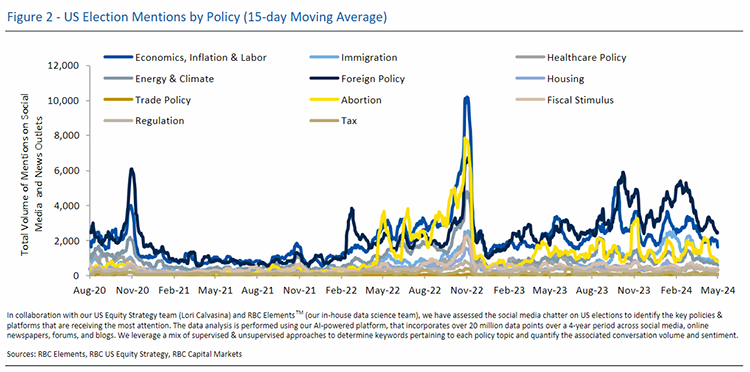Many market participants are currently parsing through think tank reports and campaign speeches, which can certainly be useful for providing broad policy contours for the next administration. However, unforeseen challenges and key personnel changes can lead to unanticipated policy outcomes and the best laid plans can be overtaken by events.
At first glance, the contrast between the two candidates could not be starker. From the start of his administration, President Trump signaled that American energy dominance would be a cornerstone of both his economic and foreign policy. The abundant American resource endowment was seen as ensuring that retail gasoline prices would remain contained. In addition, prolific US production was seen as providing the White House a freer hand to extricate itself from legacy security commitments, such as the Carter Doctrine for the Middle East.
At the same time, it was viewed as providing the bandwidth to sanction foreign policy adversaries such as Iran and Venezuela while shielding US consumers from the economic impact of such coercive measures. When American output proved insufficient to prevent price increases, President Trump would publicly cajole OPEC to increase output. Global climate commitments were scrapped as the White House focused on its full-throttle rhetorical support of the US oil and gas industry.
President Biden, by contrast, pledged to renew American leadership in the fight against climate change. Reentering the Paris Agreement and pulling the plug on the Keystone XL pipeline were among his first executive orders to demonstrate the White House's commitment to accelerating the energy transition and turning the page on the Trump era. With the early move to pause new permits for drilling on federal land, it seemed that the administration would indeed look to shrink the footprint of American oil and gas drilling. Individuals with oil and gas backgrounds were initially absent from the administration, with the staff of progressive senators, such as Senator Elizabeth Warren (D-MA), playing a leading role in vetting key appointments.
In our early conversations, senior administration officials indicated that the rapid energy transition would lessen the need to focus on energy security concerns and managing relations with key producer nations. The view that we were rapidly approaching a peak demand scenario also dovetailed with the stated policy desire to extricate ourselves from the Middle East and refocus resources on Great Power Competition with China.

For President Trump, the abundant American resource endowment was seen as giving the White House a freer hand to pursue key policy objectives, whereas for President Biden, the rapid uptake of renewables and the twilight of the age of oil were viewed as delivering a similar policy dividend. At the heart of both assumptions was a belief in a benign oil price environment, and in both cases administration policy shifted quite radically due to unforeseen events that altered oil price outcomes.
President Trump was forced to abandon his longstanding antipathy toward OPEC when the COVID pandemic and the Russia-Saudi price war caused oil prices to collapse and threatened the American shale industry. In fact, he effectively became the de facto president of OPEC in April 2020 in order to resolve the impasse over Mexican production and ensure that the largest collective OPEC+ cut in history would be implemented. In a notable foreign policy shift, Trump would also green-light military strikes in Syria and the killing of the Iranian Quds Force leader Qassem Soleimani in January 2020 despite all indications that he would avoid military entanglements in the Middle East
President Biden essentially pivoted from telling US producers to keep the oil in the ground to imploring them to produce more when faced with rising energy prices due to a war involving one of the world's largest commodity producers. At the same time, the desire to keep oil prices contained led to a distinct shift on Saudi Arabia, as the White House walked back its initial tough rhetoric and instead sought to conclude a sweeping diplomatic reset that was expected to include energy assistance and Israel normalization in return for new security guarantees and US support for a civilian nuclear program.
"The overall policy trajectory of a second Biden or Trump administration could really hinge on who fills key administration positions and who has superior West Wing access."
Helima Croft, Head of Global Commodity Strategy and MENA Research
This shift was enabled in part by the arrival of Amos Hochstein, who had extensive energy experience, to the administration. From the moment of his arrival, he prioritized getting as much US LNG to Europe as possible to stave off a major energy crisis and oversaw a policy that prioritized averting oil price shocks, whether by drawing down the Strategic Petroleum Reserve (SPR) or removing/lightly enforcing sanctions on key energy producers. Electoral considerations and a desire to appeal to younger and progressive voters seem to have at least partially influenced President Biden's February decision to pause LNG permitting. National Climate Advisor Ali Zaidi, who has deep roots in the environmental advocacy community, reportedly played a key role in pushing for this most recent LNG pivot.
Hence our view that the overall policy trajectory of a second Biden or Trump administration could really hinge on who fills key administration positions and who has superior West Wing access. We have been told by former Trump administration officials that securing the last Friday meeting on the calendar often yielded significant dividends in obtaining presidential sign-off.
While President Trump has several core foundational policy issues—including securing the border, reducing regulatory red tape, and cutting taxes—a lot potentially remains in play and key advisors may use their powers of persuasion to shape the policy landscape in non-obvious ways. For example, at first glance it would seem that a second Trump administration would lead to the defunding of Ukraine and even potentially the rolling back of Russia sanctions.
However, if Mike Pompeo—a well-established Russia hawk—is appointed Secretary of Defense, he could successfully lobby the president to continue supporting Kyiv and retain the punitive measures on Moscow. Jared Kushner is certainly a person of influence to watch, as he would likely have a very outsized and amorphous portfolio if he opts to return to Washington.
By the same token, there would likely be significant staff rotation in a second Biden administration. Freed of a need to secure another term in office, would Biden be less concerned about the oil price implications of particular foreign policy decisions and lean more heavily on the policy idealists as opposed to the realpolitik pragmatists? To that end, in our Beyond the Ballot series, each month we will be highlighting key influencers who could shape policy in the next administration and the scope for emerging challenges and key personnel changes to produce unanticipated policy outcomes.
Helima Croft authored “Beyond the Ballot: Overtaken by Events Energy Issues and People to Watch Ahead of the 2024 Election,” published on May 15, 2024. For more information on the full report, please contact your RBC representative
